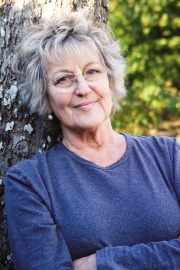09 April 2015
 Germaine Greer’s passion for the environment is now well known. She has written deeply and personally about how the connection to a small piece of Australian bush came to her almost as a revelation.
Germaine Greer’s passion for the environment is now well known. She has written deeply and personally about how the connection to a small piece of Australian bush came to her almost as a revelation.
But never one to jump onto anyone’s bandwagon, Greer’s views on conservation and the future of the planet are complex and subtle.
In a special presentation brought to Adelaide by the University of South Australia’s Hawke Research Institute on Wednesday April 15, Germaine Greer will discuss the challenges human beings must face if they are to survive on planet earth.
Entitled Earth can survive without people; People cannot survive without earth, the lecture will examine the range of responses to the challenges we face in terms of climate change, food production and the preservation of biodiversity.
Noting the views of great thinkers such as Stephen Hawking, who believes human salvation may only be secured by colonising space, and the passion of great doers such as the late Wangari Maathai, who organised Kenyan women to propagate native trees in what became the Green Belt Movement, Greer will explore some of our options and the truth that there are no easy answers to survival on earth.
The lecture will showcase how women around the world have taken action to protect the environment locally and how big movements such as the conservation movement have struggled to mobilise action when there is not enough support from governments and politicians.
She will also look at how such big and troubling problems can create a sense of doom and despair.
“Most of us love Earth, and have no desire to migrate to another galaxy,” Greer says.
“There is no easy answer.
“But one way of relieving our own unease and anguish, perhaps the only way, is to start doing it for ourselves.
“If we can rebuild a fragment of a single ecosystem, train ourselves to acquire the skills and the knowledge to reverse the process, we can be amazed at our planet's power to regenerate.”
Earth can survive without people; People cannot survive without earth commence at 6pm
Allan Scott Auditorium Hawke Building, City West campus.
While in Adelaide Germaine Greer will also be delivering an academic Masterclass on ecofeminism and survival and she will be sponsored by the Hawke Institute to present at the Museum of Old and New Art (MONA) in Tasmania at a special “in conversation” event hosted by Myf Warhurst and MONA curator Jarrod Rawlins on April 16.
Germaine Greer was born in Melbourne and educated in Australia and at Cambridge University. Her first book, The Female Eunuch (1969), took the world by storm and remains one of the most influential texts of the feminist movement. Germaine Greer has had a distinguished academic career in Britain and the USA. She makes regular appearances in print and other media as a broadcaster, journalist, columnist and reviewer. Since 1988 she has been Director (and financier) of Stump Cross Books, a publishing house specialising in lesser-known works by early women writers.
Media contact: Michèle Nardelli office: +61 8 8302 0966 mobile: 0418 823 673 email: michele.nardelli@unisa.edu.au




